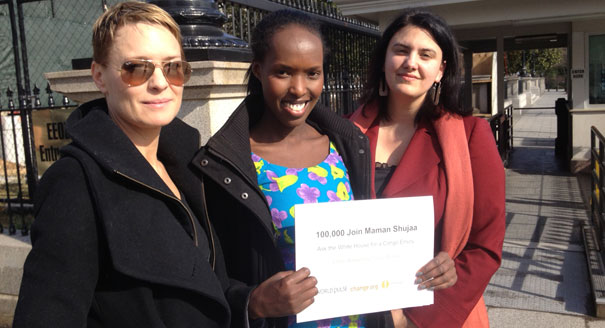
This op-ed co-authored with actress Robin Wright originally appeared on Politico.
On March 18, one of the world’s worst warlords, Bosco Ntaganda, turned himself in to the U.S. Embassy in Rwanda. Ntaganda, also known as “The Terminator,” is the leader of several brutal armed groups and army units, including the M23, that have terrorized eastern Congo for over a decade. He is wanted by the International Criminal Court for war crimes and crimes against humanity.
As we write this, Ntaganda is being transferred to The Hague, and a hesitant celebration has spread throughout a region home to the deadliest conflict in the world since World War II.
Further good news came on March 18 when the United Nations announced the appointment of Mary Robinson as the secretary-general’s special envoy to the region, delivering the highest level of diplomatic gravitas to broker a peace deal between the government of Congo, the M23 rebel group and regional governments. These events present a historic opportunity to secure lasting peace for the people of eastern Congo, and an urgent opportunity for the U.S. government to take action.
When we first traveled together to eastern Congo in late 2011, the devastating effects of Ntaganda’s reign were felt and seen everywhere. We met with survivors of sexual violence and former child soldiers — both of whom were healing from their wounds of war and working toward a better future. Civil society groups and human rights activists informed us firsthand of fighting between armed groups over Congo’s vast natural resources. It was clear the profits made from the violent extraction and trade in Congo’s minerals was funding the continuation of the conflict and that Ntaganda was at the center of the trade.
In early 2012, mounting international pressure calling for the arrest of Ntaganda sparked his retreat from the Congolese city of Goma, where he had been living in the lap of luxury in spite of his arrest warrant. With the help of the Rwandan government, he formed the M23 rebellion with a group of defectors from the Congolese army. When M23 took over Goma and launched intense fighting with the Congolese army, it was clear the international community had to act. A tentative ceasefire agreement was put in place and regional peace negotiations were started.
Throughout the escalation of this conflict, one thing has remained constant — the lack of high-level engagement from the U.S. government. After the fall of Goma, the Enough Project led activists in calling for swift action from Washington to condemn Rwanda’s support for M23. Once negotiations were under way, we asked for the Obama administration to demonstrate its commitment to seeing lasting peace in eastern Congo by appointing a high-level envoy to lead a coordinated response to this crisis. President Obama placed a call to President Kagame of Rwanda, and budgetary aid to Rwanda through the World Bank was withheld, but still no strong action was taken.
Direct pressure on the White House was ramped up when we partnered with World Pulse to promote a petition written by Congolese activist Neema Namadamu and a group of women of eastern Congo who are calling for a U.S. special envoy. Within weeks, their petition on Change.org surpassed 100,000 signatures. In January, we delivered the petition to the White House — directly sharing the demands of women leaders in Congo. Still, there was no response from the White House or newly appointed Secretary of State John Kerry.
Ntaganda’s surrender will be only a blip on the radar screen if it is not followed up by a more comprehensive peace process with high-level U.S. support. Robinson will need strong political and diplomatic support from the U.S. government to bring the different parties to the negotiating table in good faith. Additionally, a U.S. special envoy can help to ensure that the peace process addresses the underlying causes of conflict and includes the involvement of Congolese women in civil society.
Obama and Kerry must listen to the call to action voiced by Congolese women, U.S. based activists and even members of Congress. Rep. Karen Bass (D-Calif.) introduced legislation on March 21 that calls for a comprehensive approach to resolving conflict in the region, including the appointment of a U.S. envoy.
This is a historic opportunity to address root causes of conflict in eastern Congo and lay the foundation for a lasting peace. We are asking the president and secretary of state to appoint a high-level U.S. envoy to the Great Lakes region — there is no better time than now.
Robin Wright is an actress and activist, @RealRobinWright. JD Stier is the Enough Project’s Raise Hope for Congo campaign manager, @JDStier. Beginning Tuesday, the Enough Project will launch a week of action aimed at the appointment of a high-level U.S. envoy to the Great Lakes region, including Congo.

